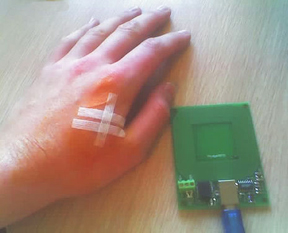| Chip implants that keep track of personal information seem like a novelty but do they have a more useful future?
by Katherine Nightingale
These days, some people are following their pets and getting tagged. Radio frequency identification (RFID) chips are the size of a grain of rice and can be loaded up with personal information like passwords and implanted under the skin. Instead of having to remember a login code, an RFID reader can be set up to automatically detect it and grant you access to a range of things from your computer to your front door.
It seems like it could be useful to people with exceptionally poor memories, but right now these chips are being snapped up by technology geeks like Amal Graafstra. The 29-year-old businessman from Vancouver, Canada, is one of the first people to have an RFID implant and so far is happy with the results. "I just don't want to be without access to the things that I need to get access to. In the worst case scenario, if I'm in the alley naked, I want to still be able to get in [to my house]' he says. In his chip, he has stored a unique identification number which can be used to log him into various electronic devices. It didn't cost him an arm and a leg either: he got the whole set-up on the internet for about $50 (£30), including the $2 cost of the chip itself.
The procedure to implant the chip is quite simple and painless. Amal's chip was implanted under the skin of his left hand while he was under a local anesthetic. It is possible to inject the chips using a large enough needle, but in Amal's case the chip was inserted by simply cutting through his skin with a scalpel. Other than complaining of sensitivity in the area of the implant, Amal said that it doesn't hurt and he expects that eventually the chip will be completely unobtrusive.

A hand implanted
with an RFID chip and the chip reader.
|
The chip is made of silicon and is digitally encoded with information.. A RFID reader, which is installed in a computer or an electronic device like a reader by a front door, emits a radio signal of a particular frequency, just like radio stations each broadcast on their own frequency. The chip acts passively when it is within 3 inches of the reader: the right incoming radio signal induces just enough energy in the antenna of the chip for a circuit in the chip to power up and produce a response. The reader can then access the information on the chip and pass it on to the computer or device that requires it.
The process sounds simple but how safe is it? At least when your personal details are stored in your head, there is little chance of them being revealed, except through brute force or on a drunken night out. Although more than one chip can respond to the same frequency, the information stored on each one is unique, as are the codes required by an individual reader. Someone would have to guess a password to break into a system, the same chance you run if a password is stored in your head.
Although they sound safe enough, it still begs the question of how useful these chips really are. The potential of this technology, however, stretches beyond personal use since the chips are not only capable of storing ID numbers but also other read-only information. They have already been suggested as a means of combatting identity fraud, to store medical records and in law enforcement for the authorities to track individuals. Protesters in the U.S. are already referring to such tags as 'spychips', with even the use of tags on consumer products being boycotted because of worries over privacy and civil liberties.
But health issues related to the implants exist, such as the possibility of them migrating around the body or interfering with equipment like MRI scanners. Skeptics are quick to point out that conductive metal implants in the body could result in burns if a tagged person was to undergo an MRI scan, though there is no evidence of this occurring and RFID implants have been approved by the FDA.
Apart from tech geeks, most people may have to be convinced that there are more benefits to this technology than drawbacks. If the controversy over basic biometric ID cards in the U.K. is anything to go by, where civil liberties campaigners protested that too many establishments would have access to a person's private details, it will be awhile before we're all walking around with chips and opening doors with the wave of a hand. For the meantime, most of us seem to be satisfied with storing our personal information mentally, and not being the hot conversation piece at dinner parties.
|
